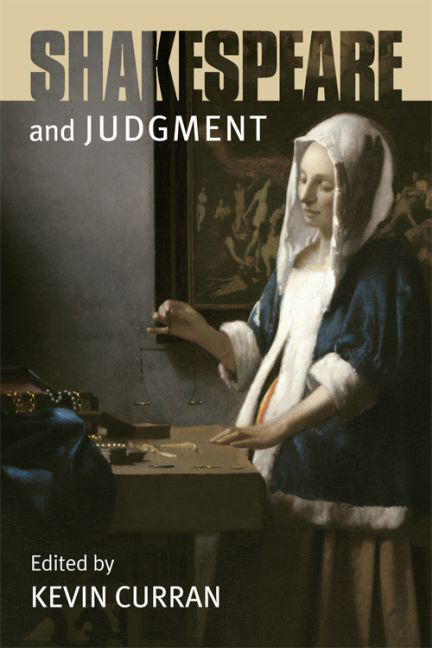Book contents
- Frontmatter
- Contents
- Acknowledgments
- List of Contributors
- Introduction
- Part I Staging Judgment: Deliberation in the Plays
- 1 Preventive Justice in Measure for Measure
- 2 Believing in Ghosts, in Part: Judgment and Indecision in Hamlet
- 3 Shakespeare's Law and Plowden's Authority
- Part II Audience Judgment: Deliberation in the Theater
- Part III The Ethics of Judgment
- Index
3 - Shakespeare's Law and Plowden's Authority
from Part I - Staging Judgment: Deliberation in the Plays
Published online by Cambridge University Press: 10 May 2017
- Frontmatter
- Contents
- Acknowledgments
- List of Contributors
- Introduction
- Part I Staging Judgment: Deliberation in the Plays
- 1 Preventive Justice in Measure for Measure
- 2 Believing in Ghosts, in Part: Judgment and Indecision in Hamlet
- 3 Shakespeare's Law and Plowden's Authority
- Part II Audience Judgment: Deliberation in the Theater
- Part III The Ethics of Judgment
- Index
Summary
The challenge of interpreting the words of a statute so that they address the nature of the case to be decided has elicited abundant commentary from Aristotle in Nichomachean Ethics to members of the judiciary in countries that have relied on the English common law. Edmund Plowden's part in shaping this discourse has been decisive, in large part because he understood that the meaning of the words of a statute could only be discovered by considering the moral function of equitas, that is, of equity or what we might think of as a fairness reflecting both the “mischief” the statute under review was designed to cure and that which the case to be adjudicated could be seen to illustrate. This chapter will address Plowden's understanding of such equitable interpretation in one of the best known of his reports in his Commentaries, Eysten vs. Studd, 1574, with a preliminary account of his first report, Reniger vs. Fogossa, 1551. Further than the penetrating analyses of law represented in the Commentaries, however, Plowden contributed to the language of the law in another way. Entering the Middle Temple as student of the common law in 1538, Plowden was exposed to (and may well have joined) perhaps the most notable activity undertaken at the Inns of Court in general: the “readings” or what were in effect mock trials of imaginary cases in which students argued for particular decisions. The “facts” of these “cases” were of course fictional; nevertheless they required effective interpretation. The trans-disciplinary character of these “readings” was also registered in contemporary theater that embraced legalistic intrigue. Demonstrated acutely in the unraveling of plot in George Gascoigne's Supposes, a source for Shakespeare's The Taming of the Shrew, such plays demonstrate the resources of a critical ambiguity available to authors who want to introduce audiences to a “reality” that is no more than fiction and that can in fact only be supposed.
Plowden's description of his own situation as a recusant lawyer after the accession of Elizabeth I and the consequent passage of the Act of Supremacy and the Act of Uniformity, 1559, shows how carefully he approached the use of words and language as they communicated political, ethical, or religious beliefs and positions.
- Type
- Chapter
- Information
- Shakespeare and Judgment , pp. 71 - 90Publisher: Edinburgh University PressPrint publication year: 2017



